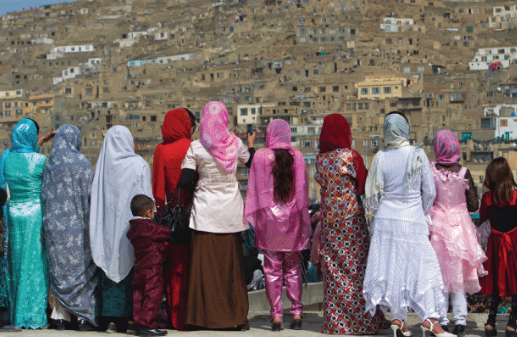I’M NOT GOING ANYWHERE
1. In February 1961, Mary MacMakin arrived in Afghanistan with her husband and four children, landing on a snow-strewn runway in the capital, Kabul. It was a trip into the unknown for the 31-year-old aid worker and her family. Little did MacMakin know that her trip would kindle a decades-long dedication to Afghanistan, a country MacMakin has now long called home.
2. A Boston native who majored in physical therapy at Stanford University, MacMakin had lived a privileged life in the United States. However, it was in impoverished (...) Afghanistan where she says he found her true calling as a humanitarian (...) worker at the height of the Cold War. “I have always felt...at home here,” says the 87-year-old, who lives in a cramped (...) , shared apartment in Kabul. “I have fallen in love with the mountains and the people.”
3. Since first arriving 56 years ago, MacMakin has witnessed history, living through the overthrow (...) of the monarchy, a communist coup, the Soviet occupation, the rise and fall of the Taliban regime, the US-led invasion, and the international military withdrawal (...) in 2014. During these periods of turmoil (...) , MacMakin ran projects for humanitarian groups like Save the Children and CARE (Cooperative for Assistance and Relief Everywhere). In 1967, the family moved back to the United States. Four years later, MacMakin returned to Kabul alone to continue her aid work, while her husband stayed behind to raise their children.
4. The 1979-89 Soviet occupation (...) of Afghanistan and the brutal (...) 1992-96 civil war forced her to leave. Returning again to Kabul in 1996, she said she was “shocked” by what she saw. Most of the city had been reduced to rubble. Kabul resembled a wasteland (...) . However, that did not stop her from opening PARSA (Physiotherapy and Rehabilitation Support for Afghanistan), a nonprofit organization dedicated to helping women and children made widows and orphans by the wars.
5. Most of the thousands of international aid workers, diplomats, and security contractors who came to Kabul following the fall of the Taliban in 2001 have since left, especially after the withdrawal of most international troops at the end of 2014. However, despite the escalating (...) violence and political turmoil, a small number of foreigners, including MacMakin, are committed to riding it out in their adopted home. “I’m not going anywhere,” says MacMakin. “It is hard for people, even Afghans, to imagine why a foreigner would want to live in Afghanistan, but it has an undeniable attraction.” (Reading text adapted from rferI)

